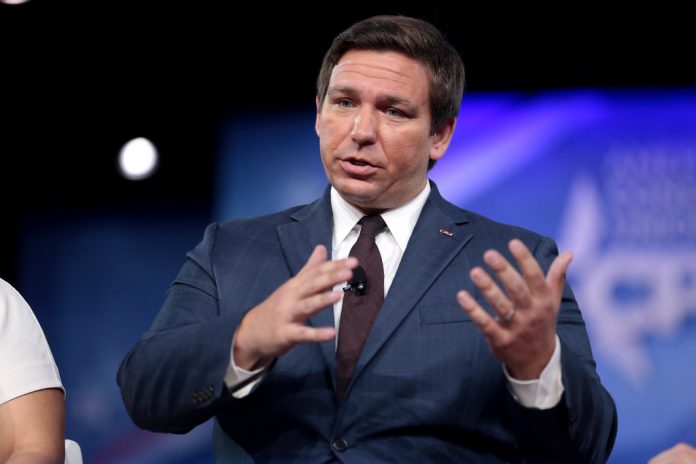The Florida Supreme Court gave Gov. Ron DeSantis the green light to impanel a statewide grand jury to investigate the safety and efficacy of COVID-19 shots over a 12-month term, on December 23.
The “pharmaceutical industry has a notorious history of misleading the public for financial gain,” states the governor’s petition to the high court. “[There are] good and sufficient reasons to deem it to be in the public interest to impanel a statewide grand jury to investigate criminal or wrongful activity in Florida relating to the development, promotion, and distribution of vaccines purported to prevent COVID-19 infection, symptoms, and transmission.”
Misinformation Effect
People were pushed or coerced to get vaccinated based on inaccurate information, according to DeSantis’ petition.
“[T]he federal government, medical associations and others have created an expectation that receiving a COVID-19 vaccine is an ethical or civic duty and that choosing not to get vaccination against COVID-19 is selfish and harmful to others,” states the petition.
“…While Florida rejected vaccine mandates, many people chose to receive the shots “because they believed that receiving the vaccine would prevent them from spreading COVID-19 to others.”
The closed-door inquiry does not require specific allegations of crimes, says Robert E. Moffitt, a senior research fellow at the Center for Health and Welfare Policy at The Heritage Foundation.
“It is unclear exactly what the Grand Jury is investigating or what it will find,” said Drew Keyes, a senior policy analyst at the Pargon Health Institute. “It all leads back to the same fundamental problem plaguing public health: a lack of trust.”
Call for Consequences
Other states should follow the lead of DeSantis, says Elizabeth Lee Vliet, M.D., president and CEO of Truth for Health, a patient advocacy organization, in a press release.
“This, America, is how our Constitution Republic is supposed to work, with states controlling all powers not specifically enumerated in the Constitution as belonging to the Federal government,” said Vliet. (author’s emphasis) “Gov. DeSantis’ bold and courageous leadership at the state level is showing all of us how each State in the United States of America can exercise its investigative, legal, and judicial authority to investigate threats to the public safety of the citizens of that state and hold wrongdoers accountable,” said Vliet.
States’ Primacy
States are in the best position to hold federal health agencies like the Centers for Disease Control and Prevention (CDC) accountable, says Keyes.
“The CDC’s original mission was to support state public health efforts,” said Keyes. “What we’ve seen since the pandemic shows just how much that relationship has changed, as more and more power has been concentrated in Washington.”
States have broad powers, says Moffitt, co-author of a policy brief, “COVID-19 and the Federalism: Public officials’ Accountability and Comparative Performance.”
“As a constitutional matter, the states—not the federal government—are granted broad police powers to protect public health and safety,” said Moffit. “On the ground, the primary responsibility for protecting the public in a pandemic rests with the states, and the federal government’s role is secondary, providing scientifically valid information, data, and guidance, as well as financial and technical support.”
Surveilling Unexpected Deaths
DeSantis also directed Florida Surgeon General Joseph Ladapo to put together a surveillance program to investigate cases of sudden deaths of people who received the mRNA shots made by Moderna and Pfizer BioNTech.
The program will be modeled on a German autopsy study that found “final diagnoses consistent with vaccine injury syndrome,” wrote Peter McCullough, M.D., MPH, on Substack.
Ladapo will also oversee the Florida Public Health Integrity Committee, appointed by DeSantis, which will review data and make recommendations for further action. The Panel members include Jay Bhattacharya, M.D., Ph.D., and Martin Kuldorff, Ph.D., two of the signers of the Great Barrington Declaration, which urged a more focused approach to deal with the pandemic during its early stages.
Other panelists include Tracy Beth Hoeg, M.D., Ph.D.; Joseph Fraiman, M.D.; Christine Stabell Benn, M.D., Ph.D.; Bret Weinstein, Ph.D.; and Steven Templeton, Ph.D.
‘Epic in Policy Failure’
Florida’s actions could inspire other states to follow suit, says Keyes.
“I think we will see a renewed focus on public health throughout the country, which is no surprise as Americans begin to take stock of the failures of our federal response to the pandemic,” said Keyes. “Whether such actions take the same form remains to be seen, but there will be a strong interest in assessing the state and federal role, and hopefully more states will take a strong leading role in that relationship.”
Open discussion of issues and locally determined policies would help re-establish confidence in public health agencies, says Keyes.
“An open and honest local conversation about the poor information coming out of federal public health agencies and how they interact with private industry should be a positive step in restoring that trust,” said Keyes. “The way to reach that goal is through an inclusive process that listens to people and tailors a public health approach to their needs, rather than the centrally dictated one-size-fits-all approach we’ve seen fail. Given Washington’s meat-axe attempt to impose a vaccine mandate, it is appropriate for more prudent state public health officials to address the problem.”
Restoring trust in public institutions will be difficult, says Moffit.
“Unfortunately, the federal government’s performance, ranging from mixed messaging on masks and mandates to ill-conceived recommendations for social, economic, and educational lockdowns, has been an epic in policy failure,” said Moffit.
AnneMarie Schieber (amschieber@heartland.org) is the managing editor of Health Care News.



















